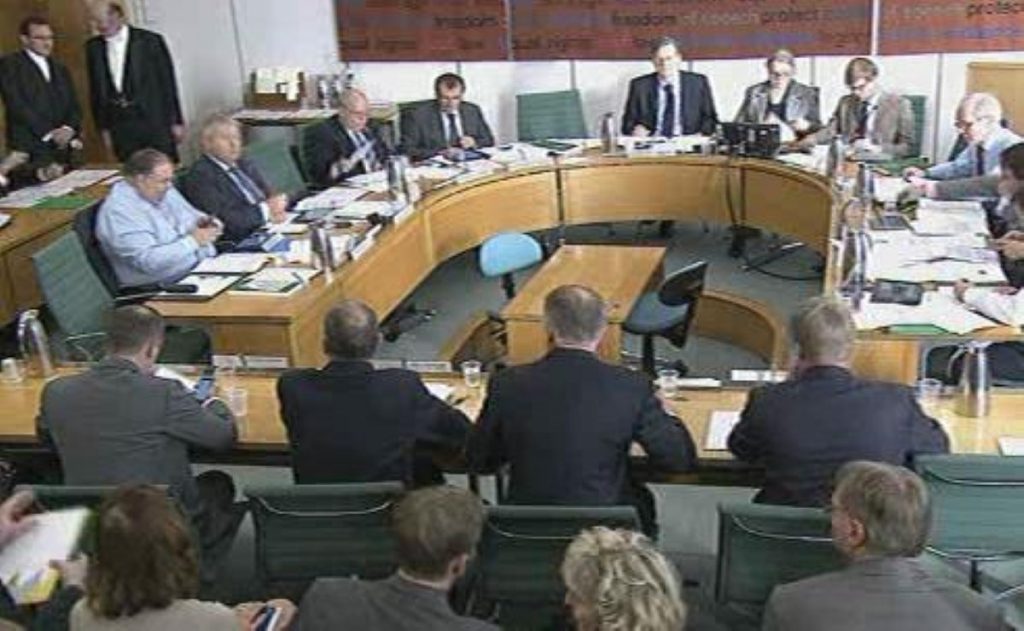Energy prices grilling sketch: Three suits and a salesman
The logic was impenetrable, the avalanche of numbers overwhelming. But this afternoon's grilling of energy firm bosses contained a big clue proving the suspicion of everyone that electricity and gas is all but dead. That clue was sitting on the end, impatiently waiting his turn.
"We're all trying to break down where the money has gone," this slick-haired, rosy-cheeked newcomer told MPs. "You will never find it. These guys are among the best filibusterers in the business."
The pronouncement of Stephen Fitzpatrick, the managing director of challenger firm Ovo, seemed to resonate with the MPs on the energy and climate change committee. By the stage of this cheery prognosis of failure they had got precisely nowhere in their questioning of senior executives from nPower, SSE and E.ON. Energy bills are governed by strange, incomprehensible forces, but these were made all the more baffling by the burblings from these bosses gathered today.
Fitzpatrick kept his own message simple. If his prices had been in place in 2012, customers would have paid £3.7 billion less, he claimed. He said Ofgem had "almost entirely failed in our lifetime". He accused the Big Six of "maintaining the illusion of competitive pricing". It was all very refreshing. The three bosses sitting to his next didn't like it one bit.


Apart from the repeated lip-twitching of Tony Cocker, the only chief executive who'd bothered to respond to the MPs' summons (the others sent lesser lackeys), they sat there stolid and immobile. It was as if this young man to their left had been let in by accident.
He was milking this opportunity for everything he could get. "We're so much cheaper," he continued, happily explaining why Ovo is so marvellous to the watching audience on TV news channels. It was free advertising at its best. While the Big Six types were forced to explain that "we regret profoundly having to put prices up at any point", Fitzpatrick was busy dismantling every bit of the logic of the Big Six. His own wholesale prices had fallen. The only sensible conclusion, he inferred, was that they were all in together.
Fitzpatrick was, ultimately, nothing but a salesman. A salesman! In the energy market, forsooth! The company chiefs who stand accused of operating an effective monopoly looked appalled at the notion. Nothing indicted them more.
There's no doubt the energy companies are feeling fed up. One industry insider told me during the party conference season the very phrase 'Big Six' was a PR disaster. It implies a cabal of companies determined to maintain their unfair grip on commodities which everyone needs. But they do not have equal shares of the market, I was told; the division is actually comparable to that of the grocery sector. And you don't see the supermarkets getting into trouble.
"We're not being as effective as we should be in getting our message across," Will Morris of SSE despaired. That lament is a permanent feature of anyone in the energy sector right now. Morris, under intense pressure from the righteous anger of Labour's Ian Lavery, played the supermarkets card. It didn't convince Tory Philip Lee. "You've been very smooth," he said smoothly. "There is a suspicion you're a chorus line acting in concert." Even the thought of these middle-aged men doing the can-can would probably not placate the millions of customers facing higher bills this winter.
The smoothest of them all, though, was Ovo's Fitzpatrick, a man utterly confident in his ability to stand up against the giants. And beat them on price. "You've got very complex, confusing answers, and you'll never get to the bottom of it," he declared confidently. It's hard to see how he is anything other than right.









